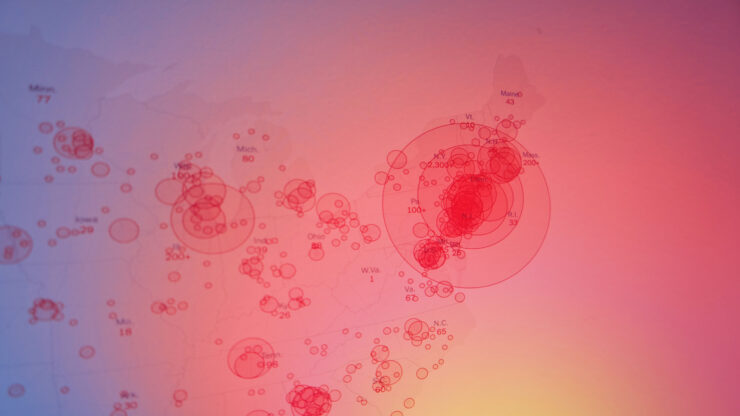Possibilities in the Pandemic

God is not surprised by this crisis. But we may be surprised by how He will use it. God will work through this pandemic as part of His sovereign plan to redeem the world. As His followers we must avoid the temptation to give in to fear. We cannot forget “that in all things God works for the good of those who love him, who have been called according to his purpose.” (Rom. 8:28 NIV)
What is His purpose? We often quote verse 28 without looking at verse 29, which tells us God’s main purpose in working for good is that we become “conformed to the image of his Son…”This article was written on July 01, 2020 by Stan Parks through Mission Frontiers
What are some ways God might use this crisis for conforming us to Jesus’ image and expanding His kingdom?
Stronger prayer—Around the world we are seeing God draw many individuals and groups into deeper and stronger times of listening, confession (2 Chr. 7:14) and intercession. A recent global Esther Fast before Easter involved tens of thousands of churches in many languages and countries.
Relying on God to work—As our human efforts are blocked or ineffective, we may well cooperate more with God as He works. As Hudson Taylor stated, “When we work, man works, when we pray God works.”
Increased faith—In times of crisis we realize we are not in control, and that draws us back to God. We are pulled back to “living by faith” (Gal. 2:20) and “walking by faith.” (2 Cor. 5:17) For many people this is a call to let God free them of their reliance on and worship of money.
Family worship and time together—Due to the lockdown in many countries and the closing of large church gatherings, many families are spending more time together and discovering or re-discovering the intimacy of worshipping together.
Church re-defined—Finding their financial structure severely challenged, churches in many parts of the world may be forcibly weaned to a new understanding of church. Rather than defining church as a building or programs, they may be providentially encouraged to return to seeing church as ekklēsia—the family of brothers and sisters called and sent out by Jesus.

Priesthood of the believer—As small groups are forced to meet outside church buildings, a greater number of believers are realizing they must and can study the Scriptures without expert help. Many are being equipped or re-equipped to lead. On a related note, Pope Francis said that “people who cannot get to confession because of the coronavirus lockdown or another serious reason can go to God directly, be specific about their sins, request pardon and experience God’s loving forgiveness.”
Openness from churches—in a recent call, movement leaders from the Americas, Asia and Africa all mentioned that many existing institutional churches previously opposed to Disciple Making Movement approaches are showing a new openness and recognition that they can and should learn from what God is doing in these new/ancient expressions of church.Witness in deeds—Many disciples at the front lines in caring for and feeding the sick and hungry are letting their “light shine before others, that they may see your good deeds and glorify your Father in heaven.” (Matt. 5:16) One leader in South Asia described disciples giving food to some former persecutors. This led to 11 men’s commitment to Christ.Witness in power—God is using Christians to miraculously bring food at times of greatest need, and to heal people through their prayers. This is opening hearts and minds to the gospel. One family in South Asia asked, “Are you angels or people, that you come and help us? We have had no food for three days and had no hope, and now you have come to give us food!”
Sacrifice—Christians risking their lives to serve medically and with food, water and sanitation offers a winsome testimony. They are the latest in a long line of Christians who have served sacrificially. During the plague in 260, Dionysius wrote: “Most of our brother Christians showed unbounded love and loyalty, never sparing themselves and thinking only of one another. Heedless of danger, they took charge of the sick, attending to their every need and ministering to them in Christ, and with them departed this life serenely happy… Many, in nursing and curing others, transferred their death to themselves and died in their stead.”
Exposing Inequity—Power and wealth are becoming concentrated in an ever-smaller percentage of the world’s population. The pandemic is shining a light on these inequalities and creating anger and energy that could have a positive impact. Jesus said, “The Spirit of the Lord is on me, because he has anointed me to proclaim good news to the poor. He has sent me to proclaim freedom for the prisoners and recovery of sight for the blind, to set the oppressed free, to proclaim the year of the Lord’s favor.” (Matt. 4:18-19)Unity—Jesus prayed that His disciples would “become perfectly one, so that the world may know that you sent me and loved them even as you love me.” (John 17:23) As Christians locally and globally band together to pray and serve, we see that the pressure of the crisis is a unifying factor for many of us.In the short term, we see many contradictory dynamics during this time of COVID-19: greater connectivity alongside growing feelings of isolation, an upsurge in both generosity and hoarding, lower crime while many criminals are freed and a respite for nature in the midst of economic destruction.
In the longer term, we pray for significant and lasting change in the Church and the Great Commission community. As humans, we know that some will be changed and some will resist change.
We have been forcefully reminded that we are one global family of humanity. Let’s pray that we as Christ’s global body will be much wiser and more sacrificial in praying, giving and working together to see the gospel proclaimed throughout the world. To know how to partner with Church Planting Movements serving in the crisis you can write to crisis@2414now.net.
Let’s pray that this crisis opens up new avenues of access to the unreached, through what we say and do, “by the power of signs and wonders, through the power of the Spirit of God.” (Rom. 15:18) The God who turned the crucifixion into the resurrection and used a ragged band of disciples to turn the world upside down, delights in turning crisis and tragedy into opportunities for redemption and life.







